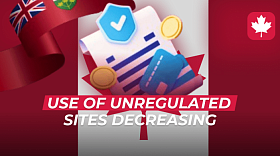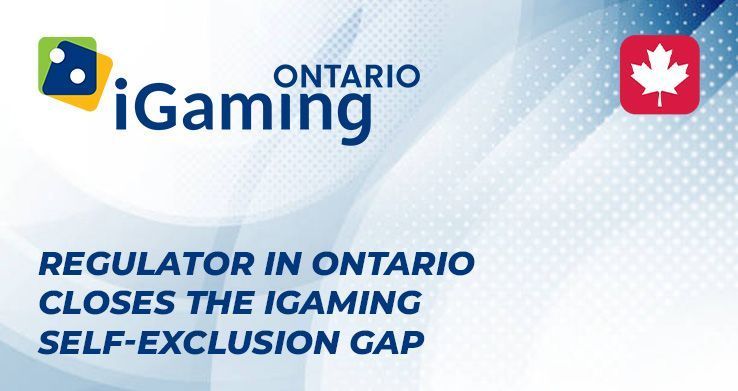Regulator in Ontario closes the iGaming Self-Exclusion Gap
Recently, iGaming Ontario announced that it had fixed a problem where players might have cancelled online bets through a loophole in a responsible-gambling program. The province's iGaming industry launched last year, and soon after that, rumors started to circulate that there was a way for gamblers to exploit a glitch and reverse losing wagers.
Every operator in the province's sector is required to offer a voluntary self-exclusion scheme that locks a player away and keeps them away for a set amount of time due to the market being regulated. For self-excluded players, the program had the ability to void all upcoming wagers and reimburse wagerers for any winnings. But, some users might have abused it, according to officials.
Problem now fixed

The self-exclusion bug that allowed users to nullify bets was a problem, according to the Alcohol and Gaming Commission of Ontario, which acknowledged it last summer. Players having the opportunity to wager on the opposing side of an event through a different operator presented another problem, giving them the chance to both secure a winning play and receive a refund.
The regulator announced this week that it has clarified the laws regarding the cancellation and refunding of bets for self-excluded users. While bets must be finished when a player voluntarily stops participating, the regulator now requires that bets can only be fully refunded if a player signs up for a self-exclusion program prior to the commencement of the game.
According to AGCO's statement, operators are not compelled to refund bets if a player enrolls in a self-exclusion policy after the start of an event or sequence of events on which the wager's outcome is decided. The regulator added that the policy adjustments, which will take effect on February 28, 2023, were decided upon after careful consideration and consultation with the industry.
A consolidated self-exclusion scheme, according to iGO, necessitates a coordinated effort from all operators with provincial licenses, while simultaneously preserving player privacy via a secure and private program. The centralized self-exclusion scheme, according to the statement, is based on best practices discovered via academic research and from lessons learned from other international jurisdictions that have multi-operator igaming self-exclusion regimes.
Approaching Unlawful Operations

In the most recent edition of AGCO's annual report covering the period from April 1, 2021, to March 31, 2022, iGO made a commitment to pursue additional legal action against unlicensed operators in the province. The regulator anticipates that even more operators will move, increasing the province's economic advantage and revenue. One of the primary things on the agenda will now be dealing with the offshore more.
The iGaming industry in Ontario swiftly grew to be among the biggest in North America, and its success sparked a lot of outside interest. About 9,000 attempts from those outside the province to put online wagers on the Super Bowl were reportedly banned, according to GeoComply, a geolocation service provider.


DeborahTheMarvellous I'm really impressed with WinSpirit's new VIP program! The tournaments sound exciting, and it's great to see a casino actually listening to what their players want. Can't wait to see what they have planned next.


Parkerroberts This is a perfect example of why self-exclusion programs exist. They’re there to help people stay away from gambling. Trying to bypass them not only defeats the purpose but can lead to serious trouble like this.


Donaldbetty It's concerning to see such young individuals involved in large-scale cyber attacks. This shows the importance of investing in cybersecurity education and preventive measures from a young age. Hopefully, the authorities can get to the bottom of this and prevent future incidents.


DonaldTheXtraordinary Wow, Jonathan Tamayo's win is incredible! But I totally agree with the conclusion. Poker requires so much skill and dedication. I’ve seen too many friends lose big trying to chase these rare wins. Slots are definitely more my speed – simple and fun!


HelenTheLoyal Wow, what an incredible win for Monica Bouma! It's true that the odds of hitting such a jackpot are insanely low, but it’s stories like these that keep people coming back. Congrats to her, though I'll stick to my smaller bingo games for fun.


HelenTheAmbitious It's great to see that Ontario is cracking down on unregulated gaming sites, but lowering the RTP to 85% feels like a sneaky way to take more from players. Regulation should mean better protection, not just more ways for the house to win.


CrazyDaniel Well, what can I say, guys, here's your trust for you. Instead of 96%, now it's 94% RTP.


ParkerSusan7 It's really disappointing to see someone with Drake's influence promoting gambling like this. Young fans might follow his lead without realizing the risks involved.


WilliamTheTenacious These new slots of yours are just another way to squeeze the last penny out of players' pockets. So where is the innovation here? Just beautifully drawn pictures and promises of big wins.


SandraTheXtraordinary Excited to see Wazdan's games coming to Fitzdares, but the reduced RTP is a bit concerning. Hope the gameplay still stays fun and rewarding!


CharlesTheLuminous Excited to see ODDSworks expanding in Ontario! Their games are top-notch, but I hope the lower RTP doesn't make it too hard to win.


RuthTheXtraordinary I can't believe how generous Nolimit City is with this tournament! 500 free spins and an iPhone 15 Plus for the winner? Count me in!

























